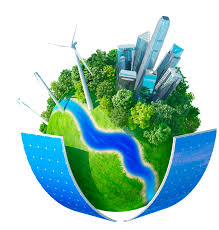People seem to think that mankind is smarter than nature, and that nature doesn’t have the ability to handle anything or everything—which is not true. The recent rise in the application of green technology has shown that nature has the capacity to do a lot of things without harming life to the extent that most non-green scientific and technological developments have. By studying environmental science, you’ll be aware of the role you have to play in protecting Mother Nature; with regard roles, some countries moved some steps further by including environmental science education at all levels in their curricula. For example, the study of environmental science is compulsory in India, regardless of your course/subject of study.
Reblogged from Godwin T. Ihagh
Fifteen Reasons ||
1. So that you will realize that environmental problems (new, old, past and present) are not only local, but global too. It’s quite funny that many laypeople don’t know what “global warming” is, especially in many cities and rural areas in Africa. The study of environmental science will keep you informed about environmental problems such as global warming, climate change, depletion of ozone layer, acid rains, and negative impact of microplastics on marine environment and biodiversity, which are not only national/local problems, but global problems as well. Efforts from experts and each of us will be needed to tackle these problems head-on.
2. So that you will understand how the impact of development, increase in population, infrastructures, and transportation systems negatively affect the environment and natural ecosystem; knowledge of these will make you more concerned about the environment, and think about how to protect it more than you’ve been doing.
3. So that you can familiarize yourself with available solutions to different environmental problems caused by poor hygiene, energy waste, etc., and apply them in ways that will create and preserve a healthier environment for future generations.
4. So that you will be aware of the environmental implications of your activities/actions, and use that knowledge to prevent/control further pollution, and efficiently utilize the resources you come in contact with on a daily basis.
5. So that you will know how to use different methods of preventing/controlling pollution and create a less-polluted or pollution-free environment containing clean air, water, food, and land.
6. So that you will use resources such as water, land, minerals and fossil fuels in an efficient manner, and with maximum utility and minimum wastage, by using conservation and recycling strategies.
7. So that you will be aware that the environment can be sustained through a combination of different disciplines, or inter-disciplinary knowledge — and you will show more concern/care for all elements of nature, in every walk of your life, and in a holistic manner.
8. So that you will be ever-conscious of our collective responsibility to pass a more comfortable and livable world into the hands of the next generation. In order to do this, each one of us has to figure out how to live more sustainably as a collective society so that there will be no threatening negative impacts on the environment.
9. So that you, like specialists, could enhance the knowledge you have and adjust its application in ways that will help you and the world to mitigate environmental changes, or halt them completely. It’s possible for anybody (a layman, a scientist, or a specialist) who reflects deeply on the environment to come up with ideas to tackle problems associated with it.
10. So that you will have a specialist’s understanding of the world around you. Do you know what could/would happen if garbage is littered indiscriminately around your house? Do you know how soil microbes affect the health of people? Do you know how climate change negatively influences the health of animals and trees around us? Do you know how environmental policies impact sustainability and alternative energy? Well, the study of environmental science will provide answers to these questions, and more.
11. So that you will be aware about other sustainable ways of living that have been discovered by scientists, specialists and some laypeople: Environmental sustainability doesn’t propose that people should not live a luxurious lifestyle, but it does advocate that people be aware about how to minimize use/consume resources, and control the disposal of waste; this includes minimizing the consumption of energy in houses, using disposal bins to dispose waste, reusing and recycling more waste/materials/products that are reusable or recyclable, utilizing eco-friendly and green products, etc. With the way natural resources are currently being depleted, they will dry up in no time, and this will affect the survival of future generations.
12. So that you can be a practitioner of/advocator for conservation of biodiversity: Biodiversity can be referred to as the variety of life forms on Earth. The current rate of biodiversity loss and extinction of living species is at an all-time high. Studying environmental science can make you be aware and become an advocator against this incessant trend.
13. So that you will understand how humans and other living organisms depend on each other: The study of environmental science will help you understand the relationship between humans and other living organism. Human beings breathe out carbon dioxide which is used by plants for photosynthesis. On the other hand, plants release oxygen which humans use for respiration. Animal droppings are used as fertilizer and nutrients for the growth of plants and other microorganisms. Also, humans and animals use plants as food. In summary, Mother Nature has made plants, human beings and microorganisms to depend on each other for survival.
14. So that you will be aware of the importance of renewable energy sources which can be easily reproduced, unlike non-renewable energy sources (like petrol, diesel, etc.) which can’t be easily produced and are the major causes of global warming and climate change.
15. So that you will be aware that the Earth is for mankind, and all other living things which morally deserve our care and respect. None of us have the right to take all resources and kill whole species for our own use. We do not have the right to drive other living things into extinction: all species have a right to exist.
Reblogged from


Great post here!
LikeLiked by 3 people
thanks for this post
LikeLiked by 3 people
Point number 14 is of concern here, as despite the hype and the propaganda, manmade global warming has not been proven. There are studies that refute that hypothesis that are never printed in any newspapers or posted on major news websites.
LikeLiked by 2 people
good observation, but I would like to see citations or links to researches that have hown—according to you—that global warming hasn’t been proven. S lot of research has rather proven the opposite of your claims.
Also, even if global warming hasn’t been proven, people shouldn’t use this as an excuse not inform themselves of the dangers and possible degradation of the atmosphere and pollution of the environment caused by using non-renewable resources which increase carbon footprint and make everywhere inconvenient for living organisms, especially when we can turn to renewable resources which are far less polluting.
LikeLiked by 2 people
for those who don’t believe in global warming, at least read about the negative effects of carbon and you would have a view of the cumulative effect/impact on environment.
to both groups that believe and don’t believe, i have to recommend that at least they should be aware of the dangers of carbon emitting nonrenewable resources to a point that they can control and manage usage of nonrenewable resources better, so that the general impact on environment could be reduced
LikeLiked by 1 person
These are very interesting! Thank you for sharing!
LikeLiked by 2 people
Thanks for sharing, a lot to think about
LikeLiked by 1 person